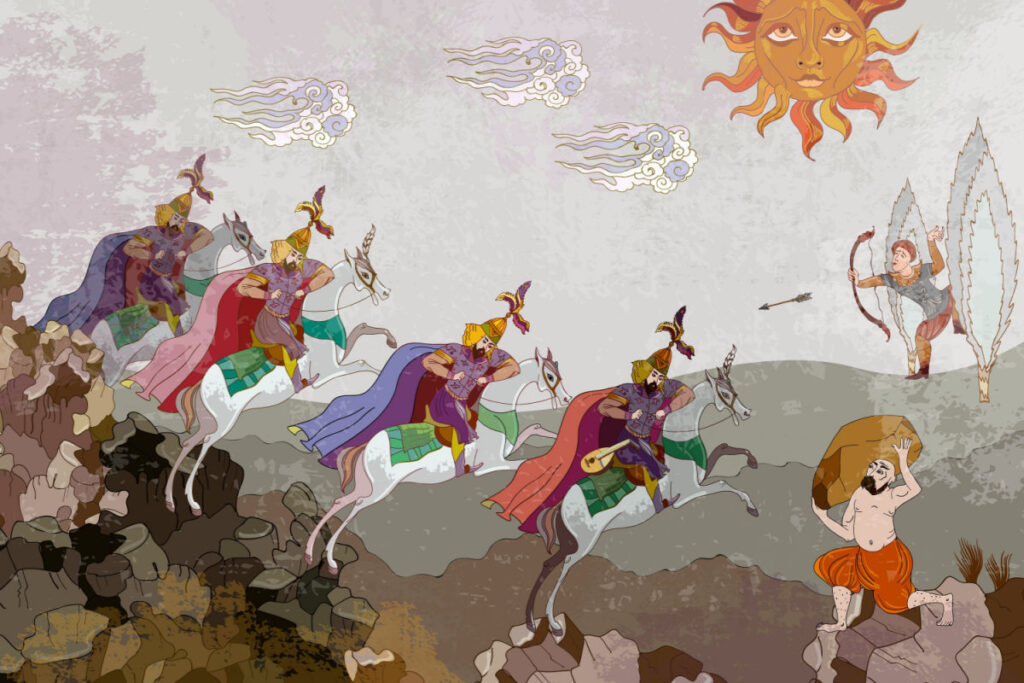Common values that have been associated with many global empires include military strength, strong leadership, cultural or religious unity, economic prosperity, intellect, and innovation.
Most successful empires had strong and charismatic leaders who could inspire loyalty and respect among their subjects.
Empires that could conquer and expand their territories often had powerful, well-trained armies.
Many empires were founded on a shared religious or cultural identity that helped to unify their people and provide a sense of purpose.
Successful empires often had thriving economies based on agriculture, trade, or industry.
Some of the greatest empires in history, such as the Greeks and Romans, were known for their advancements in science, philosophy, and the arts.
These values were not universal, and different ones placed varying degrees of importance on each. Empires also had negative values, such as cruelty, exploitation, and oppression.
Here is an in-depth look with unique insight into the values of some of the greatest empires in history.
The Persian Empire
The Persian Empire was founded around 550 BC by Cyrus the Great. Before that, the region was populated by groups of semi-nomadic tribes, which Cyrus united under his authoritarian rule. The heart of the Persian Empire was Persia, which corresponds to present-day Iran geographically.
The Persian Empire united major regions in the Middle East and the Mediterranean. The ruler tolerated different religions, but Zoroastrianism was the official one. The empire had a highly stratified social structure, which was typical of most societies in antiquity.
Connection
This value led the empire to develop commercial might. The Persians built roads and bridges to link the territories under their rule.
Tolerance
The Persians exercised religious tolerance and accepted the cultures of the conquered peoples and their unique features. The empire’s motto was “diversity in counsel, unity in command,” and aimed to combine diverse input with centralization.
The Greek Empire
The Greek Empire has left its mark on modern-day society and governance. Many societies today base their laws and ethics on those of ancient Greece. They tried to embed values like kindness, loyalty, education, and glory in daily life. These simple values helped Greek culture define history.
Education
In ancient Greece, boys were home-schooled until the age of six, then sent to a formal school. In most city-states, they remained in school until they were 14 and then had the option to study for four more years.
Schools taught boys in areas such as civil society and the arts. Civic training prepared them for the two states of life in ancient Greece: peace and war.
Glory
In the days of the Greek Empire, glory was today’s equivalent of fame. Young men yearned for the recognition that came with war glories and victorious battles. The ancient Greeks believed that the soul went down to the underworld, or Hades after someone died. Only those who had achieved some form of glory on Earth had privileges in the afterlife.
Kindness
Helping others was an essential aspect of life in ancient Greece if we are to judge by Homer’s Odyssey. The protagonist Odysseus travelled far and wide and often needed help from people. In the poem, ancient Greeks were always hospitable and offered protection, shelter, and food to strangers without question.
Greeks might have been kind and hospitable because they were afraid the gods would punish them if they weren’t. It was a desirable value to have and something they aspired to. The Greeks uphold hospitality on a collective level to this day.
Loyalty
Last but not least, loyalty was instrumental in shaping ancient Greek culture. Almost every act was rooted in this value. The ancient Greeks cherished loyalty to the gods, the family, and the community.
Loyalty to the gods manifested in accepting their decisions and judgments without question. Being loyal to the community meant providing food, shelter, or money to someone in need and protecting fellow community members from enemies.
Loyalty to the family meant doing whatever was in the family’s best interest unless it put one out of favour with the gods. The ancient Greeks believed the gods tested their values by sending hardship their way. Enduring that hardship meant showing the gods loyalty.
The Roman Empire
The Romans built a unique empire, which united the abilities to conquer and control vast territories for over a millennium. Military might was definitely a factor in its success, but not the only one. Culture and religion were significant elements uniting the subordinated peoples, who were motivated to adopt the Romans’ sophisticated, classical culture.
The Romans expanded upon the culture of the ancient Greeks, passing down Greek philosophy, architecture, and science to future generations. The Romans also embraced Christianity, making it a great world religion.
Balance of power
Roman laws influenced many present-day Western legal systems and helped inspire modern democracies’ governance systems. The Romans introduced a form of government where power was shared. It exhibited democratic, monarchical, and aristocratic elements. The US political system, with its balance of powers, is similar to the institutional division of ancient Rome.
The ancient Romans valued bravery, loyalty, piety, respect, and authority. The Roman poet Lucius defined bravery as the ability to tell good apart from evil and to fight evil. Bravery was not only courage in battle; it was courage oriented toward the common good.
They also valued health highly. A “real” man cared for his health because he couldn’t provide stability for his family if he was sick. He also couldn’t contribute to the security of the empire and its territories.
Finally, people earned respect by maintaining their status and being effective at positions with a great deal of social, economic, or political responsibility.
The Empire of the Han Dynasty
The Chinese Han Dynasty came to power in 206 BC, expanded into Korea and Vietnam, and stayed in power for over four centuries. Their Confucian ideology emphasized piety, virtue, and moderation, but this contrasted with the dynasty’s authoritarian policies. This balance contributed to the regime’s success – it was the longest-running Chinese empire in history.
Literacy and diligence
A significant focus on culture, literacy, and recordkeeping characterized the Han. For example, their Music Bureau (Yuefu) compiled and recorded detailed descriptions of contemporary music; the instruments played at the time, the songs, the techniques, etc.
The Han held culture in high regard, which was in sharp contrast to the preceding ruling dynasty, remembered for burning books and destroying cultural artefacts.
The Mongol Empire
Genghis Khan founded the Mongol Empire in 1206. It became a force to reckon with soon thereafter and lasted until the following century. At its peak, it extended from the Sea of Japan through Central Asia to Central Europe. The empire
The Mongol Empire originated on the periphery and started growing by taking Chinese territories, mirroring the pattern of many steppe tribes. It was objectively less powerful in terms of its military and population but was able to defeat much stronger enemies. It was the world’s largest empire connected only by land.
Despite a population of just two million, the Mongol Empire conquered most of China, the Middle East, and Russia. They suffered few setbacks because they could field massive, mobile armies against their enemies. They brought their herds with them and could live off horse blood mixed with water or milk.
Spiritual power, ancestor worship, and the elements
The Mongol religion before adopting Buddhism was a combination of ancestor worship, a substantial element of shamanism, and a belief in natural spirits manifested by the elements (earth, fire, and water). After Mongol ruler Kublai Khan converted to Buddhism and the Empire conquered China, a large part of the population adopted the religion, which became the official one of the Yuan Dynasty (1271-1368).
The Mongols valued sacred locations and the spiritual powers of divine beings. They also valued being at one with the universe.
They observed certain taboos and rituals to make sure they would stay in favour with the spirits and the gods. Among the taboos were shedding royal blood, stepping on a yurt tent threshold, washing something or bathing in rivers, and putting knives near a fire. The Mongols took these conventions very seriously. If you broke them, you were punished severely, in some cases even by death.
Social status
The Mongols buried their dead with their personal belongings and weapons, which suggests they believed in the afterlife. The leaders were buried in opulent tombs, indicating that the Mongols believed the afterlife was a continuation of this one. People would take their social status with them after death.

The Ottoman Empire
The Ottoman Empire reached its zenith between the 16th and 17th centuries. The empire spanned portions of Western Asia, most of Southeast Europe, and parts of North Africa.
The Ottomans valued science, law, Islam, and art. The work of the highest class of Ottoman society reflected these. Members of this class included poets, judges, ushers (prayer leaders in mosques), and scientists.
Membership of the upper echelons of Ottoman society required three elements: loyalty, the practice of Islam, and knowledge and practice of the Ottoman Way. You had to profess loyalty to the sultan and the Ottoman State and accept and practice Islam in heart and mind. The Ottoman Way was a complex system of behaviour, customs, and language.
The Spanish Empire
The Spanish Empire reached its peak in the late 18th century when it sprawled over 5.3 million square miles. It boasted great military might and economic power.
The Spanish valued culture and religion highly. This was reflected in their “New World” missions throughout the colonial period. These missions had several goals, the first of which was converting Native Americans in the New World to Christianity. The second involved instilling Spanish culture so missions would become parishes. The ultimate goal was pacifying the territories for colonial purposes.
Spain was interested in territories with valuable resources, such as silver, tar, iron, tin, gold, hardwood, copper, salt, etc., which investors could exploit.
The Russian Empire
The Russian Empire spanned almost 9 million square miles at its peak in 1895. Its sheer size and influence played a key role in stopping Napoleon’s army.
Russia had three national core values: language, culture, and religion. A now famous report to Tsar Nicholas in 1832 proclaimed three “truly Russian” principles:
- Orthodoxy (compliance with the Christian Orthodox religion and culture)
- Autocracy
- Narodnost (the “national” principle, similar to nationalism)
The Russians founded a university in Kyiv in 1833 as a centre for spreading Russian culture and language in the empire’s western provinces, which Poles populated. The Poles had rebelled against Russian rule before, so Tsar Nicholas was more than happy to enforce this measure. However, he allowed the Germans occupying the Baltic provinces to maintain their culture as they had always been loyal to the Crown and made admirable officials and army officers. They were also allowed to maintain social and cultural domination over the Estonians and the Latvians.
The Russian Empire was very hierarchical in nature. Society was divided into four groups. The peasants were at the bottom, then the clergy and the nobility, and finally, the monarchy at the top.
The British Empire
In the early 1900s, Britain controlled almost a quarter of the planet and the same share of its population. Many of its former colonies have since gained independence. Most of the members of the Commonwealth of Nations are former British colonies.
The US inherited many of its key collective values from the British, such as civil rights, the rule of law, liberalism, and trade. The British also valued organization very highly, and that’s precisely what made their empire so successful. The Crown didn’t have a huge army, but it was well-organized, and the government was financially strong.
The British conquered India by paying Indian troops. The Indians chose to serve the British because they offered regular payment and other benefits. The British could also wage wars on multiple fronts simultaneously and rarely lost them.

Lessons for America?
The US still has the most powerful military in the world. It combines the British resourcefulness for trade with the appealing culture of the Romans. It can wreak havoc like the Mongols and has spread a universal ideology like the Turks once did.
However, Rome fell despite its powerful military. The Persian Empire was torn apart by internal squabbling. The Mongol Empire dissipated because they couldn’t settle down anywhere. The British Empire ultimately burned out from trying to uphold global order.
According to The Economist, the height of “American hubris” was 2003’s invasion of Iraq, when the Americans wanted to change the whole Middle East, not only Iraq and Afghanistan, which they had occupied two years earlier. The US overestimated how effective its military could be in achieving long-term peace and political change.
Sources
- https://www.britannica.com/list/8-of-the-largest-empires-in-history
- https://nationalinterest.org/feature/the-5-most-powerful-empires-history-12296?page=0%2C1
- https://classroom.synonym.com/what-values-did-the-ancient-greeks-value-highly-12083628.html#intelligence
- https://www.britannica.com/topic/Han-dynasty
- https://www.worldhistory.org/article/1469/religion-in-the-mongol-empire/#:~:text=Mongol%20religion%20included%20a%20strong,conversion%20of%20Kublai%20Khan%20(r.
- https://www.britannica.com/place/Ottoman-Empire/Classical-Ottoman-society-and-administration
- https://www.nps.gov/articles/significance-of-missions.htm#:~:text=The%20first%20would%20be%20to,full%20members%20of%20the%20congregation.
- https://imperiumromanum.pl/en/curiosities/values-professed-by-romans/#:~:text=Values%20%E2%80%8B%E2%80%8Bfor%20the,%2C%20meaning%20%E2%80%9Chusband%E2%80%9D).
- https://www.economist.com/the-world-ahead/2021/11/08/francis-fukuyama-on-the-end-of-american-hegemony


